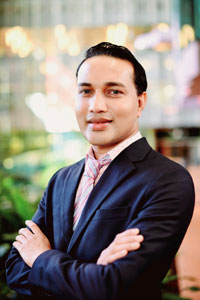Dr. Jay Gunawardana, a Sri lankan-born blood cancer researcher at the University of Queensland (Translational Research Institute in Brisbane, Australia) has received the prestigious American Society of Haematology Global Research Award.
This highly sought-after award is the result of a global search for competitive research proposals. It will enable Dr. Gunawardana to investigate the tumour microenvironment of the rare and largely neglected Nodular Lymphocyte Predominant Hodgkin Lymphoma subtype. His aim is to harness the power of patients’ own immune systems using combinatorial inhibitory drugs to remove ‘brakes’ that cause patient T-cells to become non-reactive towards cancers.
 “It is critical to match the biology of a patient’s tumour to a treatment that is both effective and will cause fewer side effects. This major step forward in our knowledge will be translated into new tools for matching a patient's lymphoma to the correct treatment and improving patient outcomes. This research project is part of a broader effort to develop cell-based immunotherapy in conjunction with immune checkpoint blockade, a highly innovative endeavour previously not attempted in treating lymphoma” Dr. Gunawardana said.
“It is critical to match the biology of a patient’s tumour to a treatment that is both effective and will cause fewer side effects. This major step forward in our knowledge will be translated into new tools for matching a patient's lymphoma to the correct treatment and improving patient outcomes. This research project is part of a broader effort to develop cell-based immunotherapy in conjunction with immune checkpoint blockade, a highly innovative endeavour previously not attempted in treating lymphoma” Dr. Gunawardana said.
Dr. Gunawardana will be working alongside Prof. Maher Gandhi, Director of Mater Research and Prof. Catherine Bollard, Director of the Program for Cell Enhancement and Technologies for Immunotherapy, The George Washington University School of Medicine. The team will also have access to the largest clinically curated lymphoma repository in Australia via The Australasian Leukaemia & Lymphoma Group and the largest collection of umbilical cord blood in Australia via the Mater Queensland Cord Blood Bank.
Dr. Gunawardana is an alumnus of Royal College (Sri Lanka), Temple University (USA), The University of Rhode Island (USA) and The University of British Columbia (Canada).
Leave Comments